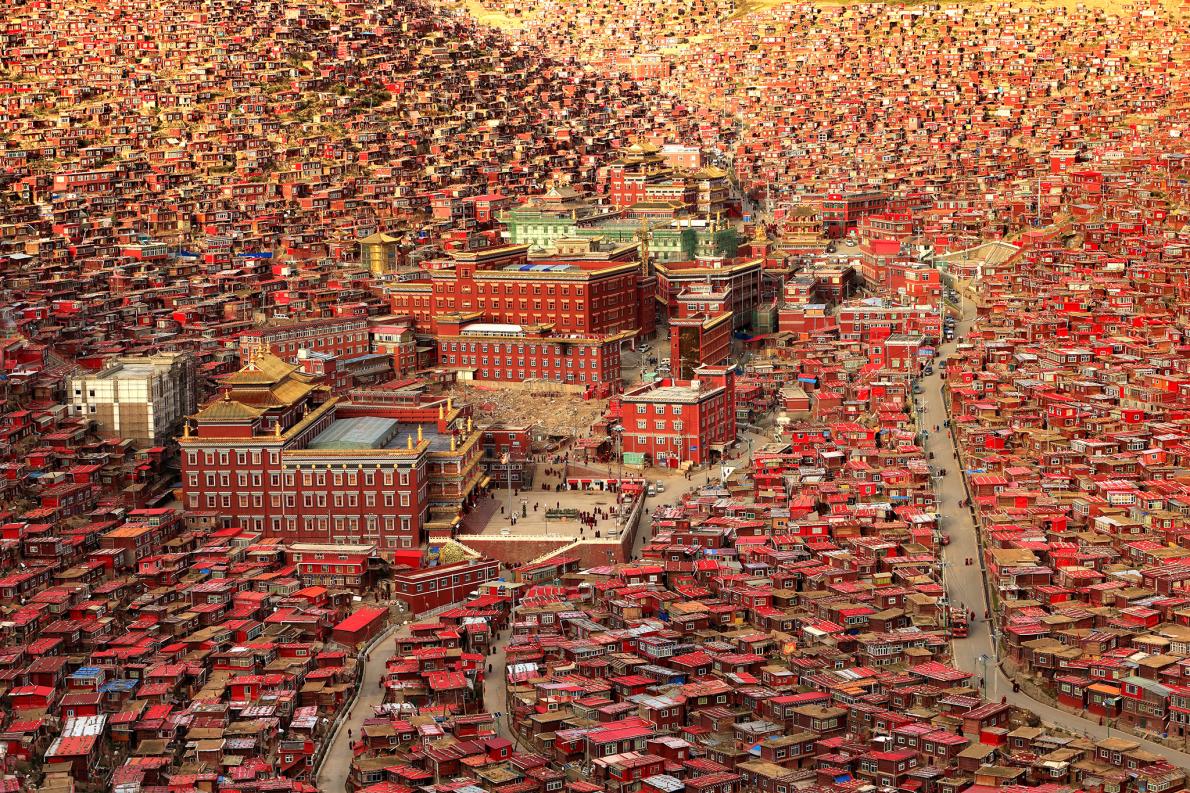The Daily Escape:

(Student dormitories surround the largest Buddhist Monastery in Tibet)
Trump spoke at Boeing’s factory in South Carolina last Friday to help unveil the latest version of the company’s 787 Dreamliner. During his visit, he praised Boeing and its employees for the new jet and vowed to protect US manufacturing jobs:
We want products made by our workers, in our factories, stamped with those four magnificent words: Made in the USA…
Boeing, however, buys many parts for the plane globally. It assembles the plane in the US. In fact, foreign parts account for almost a third of the cost of the entire plane. So much for “Made in the USA“:
- An Italian firm makes the center fuselage and horizontal stabilizers.
- A French firm makes the aircraft’s landing gears and doors.
- The Germans supply the main cabin lighting.
- The Swedes make the cargo access doors.
- A Japanese company makes parts for the lavatories, flight deck interiors and galleys.
- Another Japanese firm supplies the system’s lithium-ion batteries.
- The French make its electrical power conversion system.
- The British company Rolls Royce makes the engines.
None of those countries are low wage/low tax places. Robert Reich has a good observation about Boeing’s partners: (brackets by the Wrongologist)
Notably, these companies don’t pay their workers low wages. In fact, when you add in the value of health and pension benefits – either directly from these companies to their workers, or in the form of public benefits to which the companies contribute – most of these foreign workers get a better deal than do Boeing’s workers. (The average wage for Boeing production and maintenance workers in South Carolina is $20.59 per hour, or $42,827 a year.) They [foreign workers] also get more paid vacation days.
These nations also provide most young people with excellent educations and technical training. They continuously upgrade the skills of their workers. And they offer universally-available health care.
To pay for all this, these countries also impose higher tax rates on their corporations and wealthy individuals than does the US. And their health, safety, environmental, and labor regulations are stricter.
We’re not talking about China or Bangladesh. Boeing’s partners are in high-wage/high-tax locations. Why? Because the parts made by workers in these countries are more reliable than parts made anywhere else. Boeing isn’t concerned about costs of personnel or parts (within reason), they are concerned with reliability and total cost of ownership of the plane for their clients.
There’s a lesson here: Trump’s idea of putting a wall around America and charging more for imports won’t make us more competitive with the rest of the world. Investing more, and investing smarter in the education and skills of working-age Americans is what has to happen. Subsidized and formal on-the-job training will also help make US workers more competitive.
Trump isn’t interested in the kind of education reform which would re-energize our middle class and improve our global competitiveness. He’s simply rehashing his campaign speeches. Trade is global, and has been for thousands of years. Capital is global; there is no way to restrict its movement. Trying to implement a protectionist system will fail.
The best weapon a country has in the global competitive environment is an educated people.
Here is the British rock group Ten Years After doing “I’d Love to Change the World”. This is the lead single from their 1971 album “A Space in Time”. It was their only Top 40 hit. The Vietnam War ended three years after this song was released, so the lyric, “them and us, stop the war” had relevance then, and still has relevance now. The lyric “tax the rich, feed the poor/ ’til there are no rich no more,” has more relevance today than it did in the early 1970s when it was written.
Here is “I’d Love to Change the World”:
Those who read the Wrongologist in email can view the video here.
